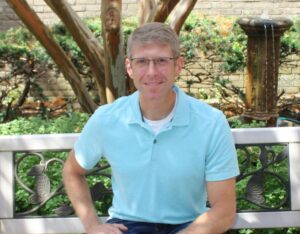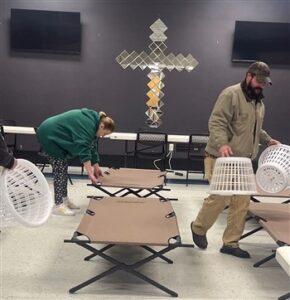Why don’t more churches decide to invite unhoused persons into their warm buildings on cold nights?
The Rev. Don Hanshew is grateful his congregation asked the hard questions and took the preparatory steps over the last year, so that Fountain City United Methodist Church could be ready to open its doors during an unusually cold winter.

The Rev. Don Hanshew
“So many of us have people who are sleeping outside against our buildings,” said Hanshew. “None of us wants to wake up and find someone who didn’t make it through the night.”
This winter, Fountain City is one of four United Methodist churches in Knoxville working with city agencies to take in people on nights when the temperature drops below 25 degrees. The other churches are Cokesbury, Magnolia Avenue and Vestal, who were the first to open warming centers in 2023.
In an interview with The Call last year, Erin Read said the United Methodists stepped up when the city asked.
“I reached out to about two dozen churches, and consistently, the congregations that reached back out and felt this visceral call to help were United Methodist,” said Read, executive director of the Knoxville-Knox County Office of Housing Stability.

Volunteers at Fountain City’s warming center prepare for guests.
With about 505,000 in population, Knox County has nearly 2,000 persons who were unhoused or at risk of being homeless in 2024, according to Knoxville Homeless Management Information System. In January 2025, five emergency warming centers (including United Methodist churches as well as a Salvation Army facility) are housing more than 300 people total on cold nights, according to Reed’s office.
Fountain City didn’t join the Knoxville warming center list until Dec. 15, 2024. When first approached by the city, the church’s council decided more time was needed to consider and prepare for the undertaking, Hanshew said.
In summer 2023, Fountain City created an Unhoused Ministries Team. One of the first steps was to learn from Cokesbury United Methodist Church‘s experience in working with the unhoused through its Fig Tree and Connection Center ministries.
“Cokesbury is a superstar, and wonderful to share a lot of information and resources,” Hanshew said.
Fountain City then set up training in “trauma-informed care” in summer and fall 2024. The summer session was led by Harmony Family Services. In fall, Metropolitan Drug Coalition led training. The goal was to train 20% of Fountain City’s congregation by 2026; 18% have been trained so far.
“There’s an inflated anxiety and concern about being around people who are unhoused,” Hanshew said, explaining the need for the training. Trauma-informed care aims to understand a person’s life situation, while prioritizing safety for both volunteers and guests. Church members felt safer when they learned the city would pay for and arrange armed security officers.
Other critical steps included organizing procedures for opening the warming center at night and helping guests leave the premises at 7 a.m. sharp – so that cleaning can be completed by 8:30 a.m.
Hanshew said that Fountain City’s warming center shares the same space with the preschool. The space is transformed from a nighttime sleeping place back to a preschool play space before the teachers arrive.
“We have to flip that space hard,” he said, “but it is clean, clean, clean and ready to go by 8:30 a.m. on weekdays.”
From a pool of about 50 volunteers, about 11 volunteers plus one security officer are needed each night over three shifts, including five on the cleaning team alone. The pastor notes 20% of their volunteers are not church members but people from the community. For churches that might consider hosting warming centers in the future, “you’re going to be delightfully surprised that people from the community will want to step up.”
Fountain City is in need of additional volunteers and partner churches, however. The call for help is even more urgent as an unusually cold weather progresses, Hanshew said. Over the last 50 years, Knoxville winters have typically included about 10 days that were 25 degrees or below.
As of January 20, Fountain City warming center has already been open for at least 15 nights, with more frozen predictions expected before spring.
“Our church members and friends who have served every other night – holy smokes,” said Hanshew, praising the volunteer force that’s feeding and sheltering as many as 25 people each night. “It’s more than we bargained for. They’re very tired but they’re passionate about this ministry.”
Hanshew understands that not all churches can open as warming centers. “Churches weren’t meant to be hotels. No judgement on churches that can’t host because it is tough.” But he recommends that more churches begin to plan emergency shelters of some type for the fires, floods and other unexpected crises that could happen in their communities. “Figure it out now because when it’s needed, you need to have a plan,” he said.
In the meantime, partnering to provide shelter to unhoused neighbors on bitterly cold nights is an obvious way for churches to work together as the Body of Christ, living into Matthew 25. Cokesbury, for example, has four partner churches that help provide food and volunteers.
“We need partner churches who are willing to set aside our denominational differences and lean into the same direction so that we can bless the most vulnerable people in our communities,” he said. “Don’t believe the rumors about the unhoused. They’re more like you than you think.”
Annette Spence is editor of The Call, the Holston Conference source of news and stories. Holston Conference includes United Methodist churches in East Tennessee, Southwest Virginia and North Georgia, with main offices in Alcoa, Tennessee. Sign up for a free email subscription to The Call. Full story here.



